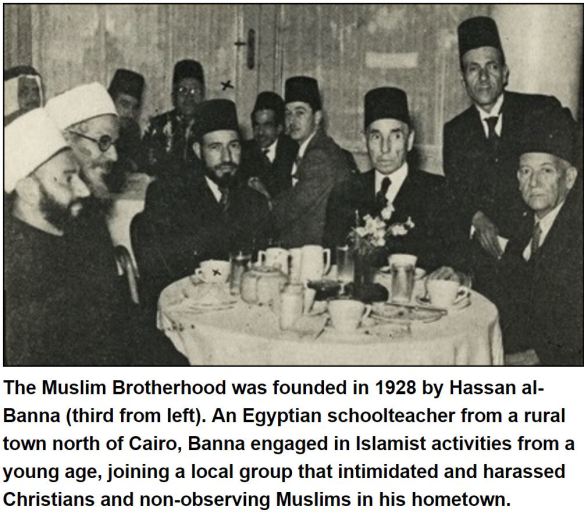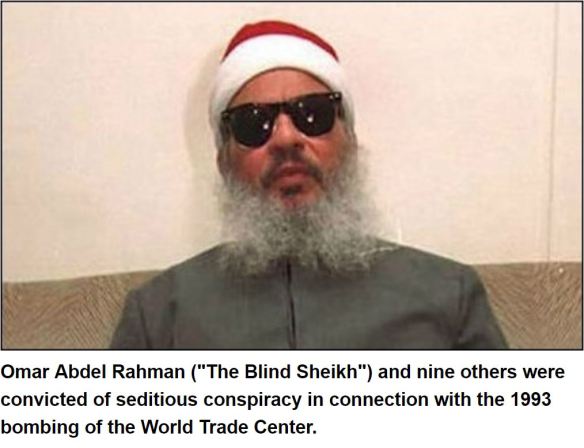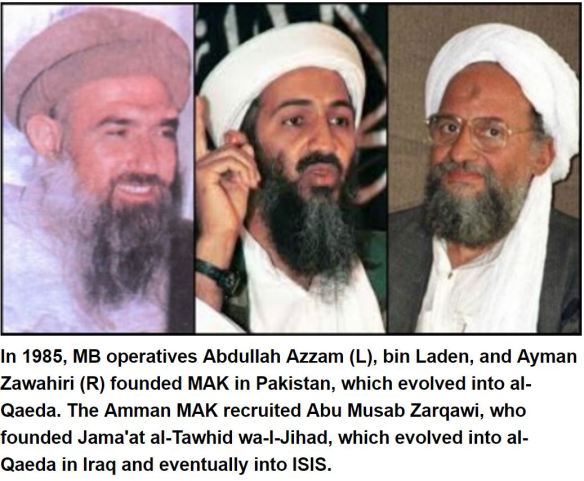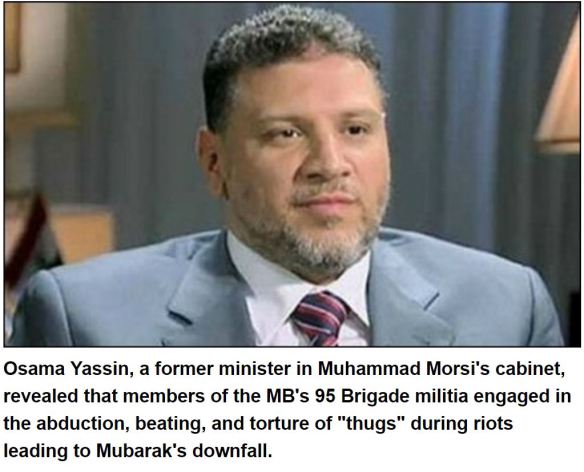THE MUSLIM BROTHERHOOD, FOUNTAIN OF ISLAMIST VIOLENCE
by Cynthia Farahat

What to make of the Muslim Brotherhood (MB)? During the Obama years, it became commonplace for the U.S. administration and its Western acolytes to portray the Muslim Brotherhood as a moderate option to "more radical" Muslim groups. Thus, for example, U.S. director of National Intelligence James Clapper incredibly described the organization as "largely secular"[1] while John Esposito of Georgetown University claimed that "Muslim Brotherhood affiliated movements and parties have been a force for democratization and stability in the Middle East."[2]
On the other hand, in 2014, the United Arab Emirates formally designated[3] the Muslim Brotherhood and its local and international affiliates, including the U.S. based Council on American-Islamic Relations (CAIR),[4] as inter-national terrorist groups. A British government review commissioned the same year similarly asserted that
parts of the Muslim Brotherhood have a highly ambiguous relationship with violent extremism. Both as an ideology and as a network it has been a rite of passage for some individuals and groups who have gone on to engage in violence and terrorism.[5]
In the United States, Sen. Ted Cruz (R-Tex.) and Rep. Mario Diaz-Balart (R-Fla.) have recently introduced legislation to designate the Muslim Brotherhood as a terrorist organization. In February 2016, the U.S. House Judiciary Committee approved a house bill that calls on the State Department to designate the Muslim Brotherhood as a foreign terrorist organization. In July 2016, Rep. Dave Brat (R-Va.) introduced the "Naming the Enemy within Homeland Security Act," a bill that prohibits the Department of Homeland Security from funding or collaborating with organizations or individuals associated with the Muslim Brotherhood.[6]
The Muslim Brotherhood has operated as a terrorist entity for almost a century.
The question is—which view is correct? Without doubt, the second one is. The Muslim Brotherhood has been a militaristic organization since its inception and has operated as a terrorist entity for almost a century. It influenced the establishment of most modern Sunni terrorist organizations, including al-Qaeda, al-Gama'a al-Islamiyya (GI) Hamas, and the Islamic State (ISIS). These organizations have either been founded by current or former Brotherhood members or have been directly inspired, indoctrinated, or recruited by MB members and literature. Contrary to what the MB propagates to Westerners, MB violence is not just in the past but is an ongoing activity.
Historical Background
The Muslim Brotherhood was founded in 1928 by Hassan al-Banna (1906-49), an Egyptian schoolteacher and sometime watch repairer from a small rural town north of Cairo. Reared in a deeply devout household steeped in the Hanbali school of Islamic jurisprudence popular among Wahhabi and Salafi jihadists,[7] Banna engaged in Islamist activities from a young age, joining a local group that intimidated and harassed Christians and non-observing Muslims in his hometown.[8] He was also fascinated by secret societies, cults, and fraternal orders, which flourished in Egypt at the time, and this obsession drove him to form the Brotherhood as a fraternity cult with its own secret militia—al-Tanzim al-Khass (the Special Apparatus, also known as the Secret Apparatus)—charged with strategizing, funding, and executing military training and terror activities.[9]
The MB infiltrated the Egyptian army with a group that overthrew the monarchy in a bloodless coup in July 1952.
During the first few decades of its existence, the Special Apparatus carried out numerous acts of political violence in Egypt, notably the 1947 assassination of Judge Ahmed Khazinder Bey and the 1948 assassination of Prime Minister Mahmoud Nuqrashi Pasha, who reportedly considered outlawing the MB.[10] At that time, according to a secret U.S. intelligence memorandum, the Brotherhood's "commando units" were estimated to possess "secret caches of arms ... reported to have 60,000 to 70,000 rifles."[11] This military buildup was ac-companied by infiltration of the Egyptian army, including the conspiratorial group of Free Officers, who in July 1952 overthrew the monarchy in a bloodless coup.[12]
The Secret Apparatus was not only involved in assassinations but also carried out a large wave of terrorism and bombings.[13] Thus, for example, on Christmas Eve 1945 it bombed the British Club in Egypt, and in December 1946 bombed eight police stations in Cairo. Two years later, the Brotherhood bombed several Jewish homes in Cairo and many Jewish owned businesses and cinemas.[14] The Brotherhood also bombed trains in Sharqia and Ismailia, as well as the King George Hotel in Ismailia. In a 1948 raid on one of the organization's Cairo offices, the police confiscated 165 bombs.[15]
After Banna's assassination in 1949, Hassan Hudaybi, who succeeded him as MB general guide (al-Murshid al-Amm), claimed to have dissolved the Secret Apparatus in order to ease the government's persecution of the movement,[16] only to be arrested in 1965 alongside other MB leaders for forming a new militia that engaged in military training with a view to assassinating President Gamal Abdel Nasser.[17] Hudaybi managed to escape with a three-year prison sentence (the MB's foremost ideologue Sayyed Qutb was executed in 1966 together with two other leaders); his false denial of the MB's military wing was to become a standard tactic of the Brotherhood to date.
Laying Infrastructure
This denial notwithstanding, the late 1960s and early 1970s saw the formation of a number of MB terror groups under ostensibly independent banners. The first such group was Gama'at al-Muslimin, commonly known as Takfir wa-l-Hijra (Excommunication and Emigration), formed by two leaders of the Secret Apparatus released from prison: Shukri Mustafa and Sheikh Ali Ismael, brother of MB leader Fattah Ismael who was executed alongside Qutb.[18] Another terrorist group created by the Brotherhood at the time was al-Gama'a al-Islamiyya (GI, the Islamic group), which was responsible for the October 1981 assassination of Egyptian president Anwar Sadat. Both groups were founded by active leaders of the Brotherhood, who never claimed to have left the organization or their leadership positions therein. Indeed, in his last speech, one month before his assassination, Sadat equated the GI with the Brotherhood and expressed regret for having released many Brotherhood operatives from prison.[19]

Omar Abdel Rahman ("The Blind Sheikh") and nine others were convicted of seditious conspiracy in connection with the 1993 bombing of the World Trade Center. During the 1990s, the Egyptian authorities battled against a sustained wave of Islamist terrorism involving attacks on government officials and the country's Coptic minority, the murdering of foreign tourists as well as an audacious attempt on the life of President Hosni Mubarak while he was in Ethiopia in June 1995.[20] In the same year, GI's leader and MB spiritual authority, Omar Abdel Rahman, known as "The Blind Sheikh," and nine others were convicted of seditious conspiracy in connection with the 1993 bombing of the World Trade Center. Abdel Rahman is currently serving a life sentence in a federal prison in North Carolina, and in Muhammad Morsi's first speech as Egyptian president in Tahrir Square, he called for Abdel Rahman's release and acknowledged the sheikh's family who was present in the audience.[21]

No less important was the formation of the movement's International Apparatus by Banna's son-in-law Said Ramadan. Having fled Egypt to Saudi Arabia in 1954, Ramadan moved to Geneva in 1958 where he established the International Apparatus under the guidance of Mustafa Mashour, head of the Secret Apparatus, future MB general guide, and author of its militant manifesto "Jihad Is the Way."[22] The International Apparatus was not fully operational until the mid-1980s when Mashour, who fled Egypt after Sadat's assassination, settled in West Germany[23] in 1986 where he reestablished the Apparatus.
The MB's International Apparatus is involved in operating and funding terrorist groups responsible for attacks on American soil.
The International Apparatus is not just responsible for the Brotherhood's public operations, but is also involved in operating and funding terrorist groups responsible for attacks on American soil. Thus, for example, Chakib Ben Makhlouf, one of the most prominent leaders of the MB's Geneva office, is also the president of the Federation of Islamic Organizations in Europe. He has been described by Egyptian member of parliament and terrorism expert Abdel Rahim Ali as "one of the most dangerous operatives of the Brotherhood's International Apparatus."[24] Likewise, according to Egyptian general Fouad Allam, who investigated the MB's operations in the 1960s-70s, the Geneva office funneled funds that helped establish al-Gama'a al-Islamiyya.[25]
Later Influence
The International Apparatus's most critical mission, though, has been to infiltrate, subvert, and recruit operatives from within the armies, governments, educational systems, and intelligence agencies of the MB's targeted states, especially in the West, in what is called "civilization jihad."
This term dates to a 1991 document titled The Explanatory Memorandum, drafted in a meeting that outlined the Muslim Brotherhood's strategic goals for North America and entered as evidence in the Holy Land Foundation (HLF) terror funding trial in 2008—the largest terror financing case in U.S. history.[26] In 2009, five MB leaders were charged with providing material support to Hamas, the Brotherhood's Palestinian branch and a designated foreign terrorist organization.
The 1980s and 1990s were the two most important decades for the "civilization jihad." During this time, Hamas was transformed from an essentially missionary and charitable organization seeking to win Palestinian hearts and minds into a fully-fledged terror group during the first intifada (December 1987-September 1993), and the seeds were sown for the advent of al-Qaeda through the newly-formed Maktab al-Khidamat (MAK, the Services Bureau), also known as Maktab Khidamat al-Mujahidin al-Arab (the Services Bureau of Arab Jihadists) and the Afghan Services Bureau.
As jihadists flocked to Afghanistan and Pakistan to fight the Soviet occupation, the Brotherhood was busy running recruitment, jihadist services through its MAK offices throughout the Middle East. In 1984, MB operative Abdullah Azzam established the MAK office in Jordan.[27] Azzam's philosophy helped establish and organize the Brotherhood's "global jihad" movement, which earned him the alias, "The Father of Global Jihad."[28] No less important, this philosophy inspired GI and Egyptian Islamic Jihad (EIJ) to try to export their terrorism and greatly inspired Osama bin Laden, whom Azzam taught at a Saudi university.[29]
In 1985, MB operatives Abdullah Azzam (L), bin Laden, and Ayman Zawahiri (R) founded MAK in Pakistan, which evolved into al-Qaeda. The Amman MAK recruited Abu Musab Zarqawi, who founded Jama'at al-Tawhid wa-l-Jihad, which evolved into al-Qaeda in Iraq and eventually into ISIS.
In 1985, Azzam, bin Laden and Ayman Zawahiri, leader of Takfir wa-l-Hijra who fled Egypt after the Sadat assassination, founded MAK in Pakistan, which subsequently evolved into al-Qaeda. Meanwhile, the Amman MAK office recruited one of the world's most brutal terrorists of modern time, Abu Musab Zarqawi.[30] Mentored by Jordanian former MB leader Abu Muhammad Maqdisi, in 1999, Zarqawi founded Jama'at al-Tawhid wa-l-Jihad (Organization of Monotheism and Jihad), which six years later, evolved into al-Qaeda in Iraq (AQI) after Zarqawi pledged allegiance to bin Laden in late 2004. This group eventually morphed into ISIS after Zarqawi's death in June 2006. Indeed, in a 2014 interview reported in Al-Arabiya News, the Muslim Brotherhood spiritual guide Yusuf Qaradawi admitted that ISIS leader Abu Bakr Baghdadi was a member of the Muslim Brotherhood.[31] For their part, several MB leaders publicly announced their support for ISIS, including the Qatar-based Sheikh Wagdy Ghoneim.[32]
The nature of al-Qaeda's current relationship with the Brotherhood is somewhat unclear. While Zawahiri argued that bin Laden's affiliation with the MB was severed in the 1980s due to differences over the anti-Soviet Afghanistan campaign,[33] this claim was discounted by Tharwat Kherbawy, the highest ranking MB member to have defected from the organization,[34] and also by evidence suggesting that the Brotherhood is still organizationally involved with al-Qaeda. Thus, for example, after Morsi's July 2013 ouster from power, Zawahiri issued a videotaped statement on his behalf where he criticized Egyptian Salafi jihadists for not formally joining the Muslim Brotherhood's Freedom and Justice Party to help it uphold Shari'a law.[35] In another statement, Zawahiri criticized the deposed MB president for having played politics with opponents,[36] but eventually prayed for his release and supported him while he was facing trial for inciting the killing of regime opponents and for espionage for foreign militant groups including Hamas, Hezbollah, and Iran's Revolutionary Guard Corp.[37]
A Political Party or a Jihadi Group?
The Obama administration's stubborn support for the Morsi regime and its tireless attempts to cast the MB as a moderate organization are preposterous—not only because the Brotherhood is the bedrock of some of the worst terror groups in today's world but also because violence is endemic to the movement's raison d'être: restoring the caliphate via violent jihad. Were the Brotherhood to give up this foundational goal, it would lose its legitimacy and sole reason for existence. This is why Banna used military terminology in structuring the MB, calling the organization "Allah's battalion,"[38] a term used to this very day to denote the MB's governing core; this is why the current Brotherhood leadership includes operatives who personally engaged in violent jihad and terror activities such as Abdel Moneim Abul Futuh.[39]
Osama Yassin, a former minister in Muhammad Morsi's cabinet, revealed that members of the MB's 95 Brigade militia engaged in the abduction, beating, and torture of "thugs" during riots leading to Mubarak's downfall.

Furthermore, the organization's Secret Apparatus remains intact and operational with new recruits required to undergo military training by such militias as the 95 Brigade,[40] which was established in 1995 and which played an active role in the January 2011 riots leading to Mubarak's downfall. In a series of interviews with al-Jazeera TV, Osama Yassin, a former minister in Morsi's cabinet, revealed that members of the brigade engaged in the abduction, beating, and torture of "thugs" and threw Molotov cocktails at their opponents.[41] Asked by an Egyptian newspaper to clarify these revelations,[42] the MB dismissed them as a joke. Still, the brigade operatives were later implicated in the killing of anti-Brotherhood protestors. In March 2014, for example, two operatives were sentenced to death after an online video clip showed them killing a teenager by throwing him from a building.[43]
According to the Brotherhood's own standards and internal bylaws,[44] there are ten solid, unchangeable thawabit (precepts) in their organization's bai'a (Islamic oath of allegiance) process. The fourth of these precepts is violent jihad and martyrdom,[45] which the Brotherhood states is an obligation of every individual Muslim, as well as the collective obligation of their organization.
The current Brotherhood leadership includes operatives who personally engaged in violent jihad and terror activities.
Unfortunately, many American specialists either receive foreign funding or are otherwise oblivious to these facts and actively engage in a disinformation campaign. For example, a Brookings Institute article turned the meaning of the "fourth precept" of the Brotherhood's bylaws on its head, stating that it stipulated that "during the process of establishing democracy and relative political freedom, the Muslim Brotherhood is committed to abide by the rules of democracy and its institutions."[46]
Reality, of course, was quite different. When after Mubarak's downfall the Muslim Brotherhood rose to power in a sham presidential election,[47] which brought its operative Mohamed Morsi to the presidential palace, its violent[48] and undemocratic rule triggered, in short notice, mass protests throughout the country that brought millions of protestors to the streets and enabled the military to overthrow Morsi in a bloodless coup.
Islamic Reformers
Indeed, the sheer brutality of ISIS and various Brotherhood-affiliated or inspired terror groups across the Middle East has led to the advent of a mainstream Islamic reformist movement that draws on vastly more popular support than the Brotherhood itself. This unprecedented revival of a reform-oriented movement has received too little attention in the West. For example, Islam Behery, one of the movement's heroic leaders, was incarcerated for a year for blasphemy for insulting al-Azhar University and the Sunni doctrine on his television show.[49] For two years, that show had been dedicated daily to exposing the brutality and terrorism of Sunni doctrine while offering a non-theocratic, liberal interpretation of Islam that pushes for separation of mosque and state. Behery received a presidential pardon in December 2016, which was unprecedented in Egyptian history.
Another supporter of reformation and freedom of thought is Ibrahim Issa, a popular Egyptian commentator, television host, and owner and editor-in-chief of the independent opinion newspaper Al-Maqal. Earlier this year, Issa announced that he would end his TV show due to "current events," kindling speculation that the cancellation was related to Saudi pressure on the Egyptian regime because of Issa's criticism of the kingdom's violent Wahhabi sect.[50] Issa's reformist stance has placed him on terrorist hit lists since 1992, and he has been living under tight security ever since. His opposition to the Muslim Brotherhood has made him one of the organization's high profile targets, and in 2015, he became the subject of an official fatwa declaring him an "infidel."[51]
Another heroic figure of Islamic reform currently facing the possibility of incarceration for blasphemy is the popular author and prominent secular figure Sayyed Qemani. His sin: stating that al-Azhar University should be designated a terrorist organization.[52] Behery, Qemani, and their like have the support of the most mainstream media figures in Egypt and across the Middle East, and they have dramatically changed the Islamic political discourse. Yet Western audiences have almost never heard of their heroic efforts.
The war of ideas is highly dynamic in today's Middle East. The vast majority of the region's peaceful Muslims are marginalized by Western support for the Brotherhood and the West's refusal to designate the MB as a terrorist organization.
Conclusion
The deadly Brotherhood cult is responsible for almost a century of terror since the young Banna engaged in the intimidation and harassment of his Christian and moderate Muslim neighbors. Since then, the Brotherhood established Hamas as its Palestinian wing. Three Brotherhood activists established al-Qaeda. Brotherhood leaders, from inside their prisons, founded al-Gama'a al-Islamiyya and Egyptian Islamic Jihad. Brotherhood members recruited the founder of Jama'at al-Tawhid wa-l-Jihad who started the trend of video decapitations, and one of its former operatives is currently acting as the caliph of Islamic State. The MB also has other connections to organizations on the U.S. government's list of foreign terrorist organizations.
The majority of the region's peaceful Muslims are marginalized by Western support for the Brotherhood.
Neither Washington, nor any capital, can hope to counter Islamic terrorism successfully without allying with Muslim figures fighting on the forefront of the battle of ideas. Washington can give these moderate Muslims a voice by designating the Muslim Brotherhood as a terrorist organization.
The Brotherhood has stated its intention to destroy the West's "miserable house" by infiltrating Western society and institutions and subverting them from the inside.[53] Designating the Muslim Brotherhood as a foreign terrorist organization will stop its operatives from reaching sensitive positions in the intelligence community and in other powerful U.S. government positions. It will also stop Brotherhood operatives in the United States from funding terrorism operations worldwide.
Cynthia Farahat, a Middle East Forum Writing Fellow and columnist for Al-Maqal daily newspaper, is currently working on a book about the Muslim Brotherhood.
[1] ABC News, Feb. 10, 2011.
[2] John Esposito, "The Muslim Brotherhood, Terrorism and U.S. Policy," The Huffington Post (New York), Mar. 22, 2016.
[3] Reuters, Nov. 15, 2014.
[4] The Washington Post, Nov. 17, 2014.
[5] Reuters, Dec. 17, 2015.
[6] Rep. Dave Brat, press release, Brat.House.gov, July 19, 2016.
[7] Abdallah Aqeel, "Al-Sheikh al-Muhadith Ahmad Abdel Rahman al-Banna al-Sa'ati," AlaqeelAbuMostafa.com, accessed Aug. 30, 2016.
[8] Hassan al-Banna, Mudhakkirat al-Da'wa wa'l-Da'iyah (Cairo: Maktabat al-Shihab, 1979), pp. 17-8, 25-6; Misr al-Balad TV (Cairo), Mar. 19, 2014.
[9] Mahmoud Sabbagh, Haqiqat al-Tanzim al-Khass (Cairo: Etisam Publishing, 1989).
[10] Abdel Rahim Ali, "Abdel Rahman Sendi: Mu'asis al-Tanzim al-Khass bi'l-Ikhwan," Islamists-Movements.com, Nov. 12, 2015.
[11] "Assessing the Islamist Threat, circa 1946," Middle East Quarterly, Summer 2006, pp. 76-82; FrontPage Magazine (Sherman Oaks, Calif.), Feb. 13, 2006.
[12] Khaled Mohieddin, Al'an Atakkalam: Mudhakkirat al-Thawra (Cairo: American University of Cairo Press, 1995), p. 45; Hassan Ashmawy, Mudhakkirat Harib (Cairo: Islamic Publishing House, 2000), p.15.
[13] Farouk Taifour, "Al-Juz' al-Rabi: al-Ikhwan wa'l-Tanzimat
al-Sirriya," Egyptian Institute for Political and Strategic Studies, Cairo, EIPSS-EG.org, Feb. 24, 2016.[14] "Profile: Egypt's Muslim Brotherhood," BBC, Dec. 25, 2013.
[15] Al-Wafd (Cairo), Dec. 14, 2013.
[16] Salah Shadi, Safahat min al-Tarikh (Cairo: Islamic Publishing House, 1987), p. 79.
[17] Ahmad Abdel Majid, Al-Ikhwan wa Abdel Nasser: Al-Qissa al-Kamila li-Tanizm 1965 (Cairo: al-Zahra for Arabic Media, 1991), p. 33.
[18] Tharwat Kharbawi, Sirr al-Ma'bad (Cairo: Nahdet Misr Publishing, 2012), p. 220.
[19] YouTube, "Al-Sadat Yatahadath an al-Gama'a al-Islamiya wa'l-Ikhwan," May 9, 2012.
[20] Efraim Karsh, Islamic Imperialism: A History (New Haven and London: Yale University Press, 2013; rev. ed.), chap. 12.
[21] TV News (Cairo), June 29, 2012.
[22] Mustafa Mashour, "Al-Jihad huwa al-Sabil," The Official Muslim Brotherhood Encyclopedia, IkhwanWiki.com, accessed Aug. 31, 2016; idem, "Jihad Is the Way," trans. Palestinian Media Watch, Jerusalem, Feb. 9, 2011.
[23] Daniel Pipes, "How Islamists Came to Dominate European Islam," National Review Online, May 25, 2010.
[24] Al-Bawabah News (Cairo), Mar. 11, 2014.
[25] Rifaat Sayed, Hassan al-Banna, al-Sheikh al-Musalah (Cairo: Akhbar al-Youm Publishing, 2004), p. 198
[26] "The Muslim Brotherhood's Strategic Plan for America—Court document," The Clarion Project, Washington, D.C., accessed Sept. 1, 2016.
[27] Farouk Taifour, "Hal Kharajat Daesh min Rahm Fikr al-Ikhwan al-Muslimin?" Egyptian Institute for Political and Strategic Studies, Cairo, EIPSS-EG.org.
[28] "Abdullah Azzam: Overview," Counter Extremist Project, New York, accessed Feb. 9, 2017.
[29] Karsh, Islamic Imperialism, chap. 13.
[30] Elaph (London), July 18, 2005.
[31] Al-Arabiya News Channel (Dubai), Oct. 14, 2014.
[32] "Al-Sheikh Wagdy Ghoneim: La li'l-Tahaluf al-Salibi dudd al-Dawla al-Islamiya," You Tube, Sept. 19, 2014.
[33] Stephen Lacroix, "Osama bin Laden and the Saudi Muslim Brotherhood," Foreign Policy, Oct. 3, 2012.
[34] Al-Aan TV (Cairo), Apr. 19, 2014.
[35] "Ta'kib al-Sheikh Ayman al-Zawahiri ala Azl Morsi wa-Tahdid al-Jaish," You Tube, July 5, 2013.
[36] "Ayman al-Zawahiri Yuwajih Risalat Itab li-Morsi wa-Yadou Allah an Yafuku Asrahou," You Tube, Feb. 11, 2014; Erich Follath, "Political Stability Eludes Polarized Egypt," Der Spiegel (Hamburg), July 29, 2013.
[37] Reuters, Dec. 17, 2015.
[38] Banna, Mudhakkirat al-Da'wa, p. 144.
[39] "Abdel Moneim Abul Futuh Yajtami ma'a Haraket Taliban Afghanistan," You Tube, June 8, 2013.
[40] Al-Wafd (Cairo), Jan. 11, 2013.
[41] Al-Jazeera TV (Cairo), Nov.-Dec. 2011.
[42] Al-Watan (Cairo), Jan. 3, 2013.
[43] Al-Arabiya News, Mar. 29, 2014.
[44] "Bylaws of the International Muslim Brotherhood," June 1928.
[45] Muhammad Kandil, "Al-Thabit al-Rab'i: al-Jihad Salbiluna," The Official Muslim Brotherhood Encyclopedia, IkhwanWiki.com, accessed Sept. 1, 2016; "The Muslim Brotherhood: Understanding its Roots and Impact, 1. Overview," Foundation for Defense of Democracies, Washington, D.C., accessed Feb. 9, 2017.
[46] Umar Ashur, "Hal Ya'ud al-Ikhwan al-Muslimun fi Masr ila'l-Unf al-Siyasi?" Brookings Institute, Washington, D.C., July 30, 2014.
[47] Daniel Pipes and Cynthia Farahat, "Egypt's Sham Election," National Review Online, Dec. 6, 2011; Shuruk News (Cairo), Mar. 22, 2016.
[48] Amb. Yahia Najm, Akhbar al-Yom TV (Cairo), in Cynthia Farahat, "CairoGate: Egyptian Diplomat Survives MB Torture Says 'It was like a Nazi camp,'" Dec. 9, 2012.
[49] Al-Ahram (Cairo), Dec. 29, 2015.
[50] Bawabat al-Qahira (Cairo), Jan. 1, 2017.
[51] Bawabat al-Haraqat al-Islamiya (Cairo), Mar. 18, 2015. The fatwa was subsequently broadcast on the official Muslim Brotherhood television channel Rabaa, broadcasting from Turkey. See Al-Arabiya News, Dec. 5, 2017.
[52] Al-Dustur (Cairo), Jan. 3, 2016.
[53] "The Muslim Brotherhood's Strategic Plan for America—Court document," The Clarion Project, Washington, D.C., accessed Sep. 1, 2016.
Cynthia Farahat is an Egyptian author and political analysist.
She is a Middle East Forum Writing Fellow and
columnist for Al-Maqal daily newspaper, and is currently working
on a book about the Muslim Brotherhood.
This article appeared in the Middle East Quarterly as Spring
2017, Volume 24, Number 2. It is archived at
http://www.meforum.org/6562/the-muslim-brotherhood-fountain-of-islamist